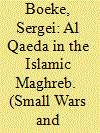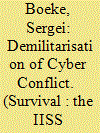|
|
|
Sort Order |
|
|
|
Items / Page
|
|
|
|
|
|
|
| Srl | Item |
| 1 |
ID:
147721


|
|
|
|
|
| Summary/Abstract |
After incurring significant losses during France’s 2013 Operation Serval in Mali, Al Qaeda in the Islamic Maghreb (AQIM) is back. Mokhtar Belmokhtar has rejoined the group, violent attacks are on the increase, and southern Libya offers elements of the group a new safe-haven. This article takes a long view on AQIM, looking at its objectives and ideology, organizational structure, relationship with the local population and revenue model to determine whether they should be labelled as terrorists, insurgents, or ordinary criminals. The article concludes that AQIM generally follows a strategy of terrorism, while some elements and modus operandi could also be indicative of a strategy of insurgency. AQIM’s primary commanders have a long-standing relationship with the global Al Qaeda movement, are unlikely to be seduced by the Islamic State, and enjoy significant autonomy in conducting their operations. There is, however, little evidence that supports the view that AQIM is a criminal organization behind a religious façade, and its Salafi–jihadist ideology remains a leading determinant.
|
|
|
|
|
|
|
|
|
|
|
|
|
|
|
|
| 2 |
ID:
162725


|
|
|
|
|
| Summary/Abstract |
The debate about state behaviour in cyberspace may be set in the wrong legal key.
|
|
|
|
|
|
|
|
|
|
|
|
|
|
|
|
| 3 |
ID:
135367


|
|
|
|
|
| Summary/Abstract |
Operation Serval, the eighteen-month mission mounted by France to oust jihadists from northern Mali, came to an end in August 2014. However, despite the transition into a broader, region-wide operation to counter terrorism, both UN and French troops remain focused on securing Mali and targeting jihadists still operating within the country's borders. Sergei Boeke and Antonin Tisseron warn against the temptation to treat the jihadists as a homogenous group with common goals and modi operandi, instead highlighting the multiple fractures within the myriad, smaller factions that must be addressed if stability is to be restored to Mali.
|
|
|
|
|
|
|
|
|
|
|
|
|
|
|
|
| 4 |
ID:
141151


|
|
|
|
|
| Summary/Abstract |
In 2013, France launched Operation ‘Serval’ to halt the southwards advance of Islamist insurgents in Mali. Using a Clausewitzian analytical framework, this article provides an assessment of France’s political and military aims in Mali and the degree to which they have been attained. Clear political goals, coordinated international diplomacy, an effective use of military force and blunders by the rebel forces turned ‘Serval’ into a short-term success. Strategically, however, the mission has proven unable to address the conflict’s underlying causes. Serval’s long-term effect is probably better measured by what it prevented than what it contributed.
|
|
|
|
|
|
|
|
|
|
|
|
|
|
|
|
| 5 |
ID:
181736


|
|
|
|
|
| Summary/Abstract |
The 2012 crisis in Mali, where the state collapsed and terrorist groups took over the north, came as a surprise to many. Mali had been considered a poster-child for democracy and was judged as considerably more stable than its neighbors by leading quantitative indices of state fragility. This article explores how quantitative risk and qualitative threat approaches led to incomplete analyses, and how bureaucratic processes stifled a holistic diagnosis of the situation in Mali. French and Dutch government views are analyzed, adding new empirical information on how ministries and embassies were unwilling to call out disconcerting developments in Mali.
|
|
|
|
|
|
|
|
|
|
|
|
|
|
|
|
|
|
|
|
|